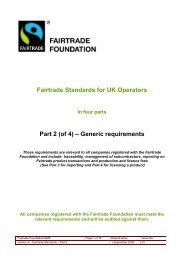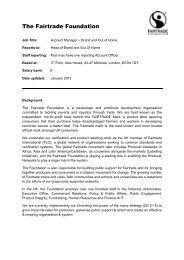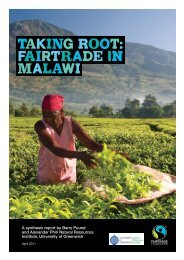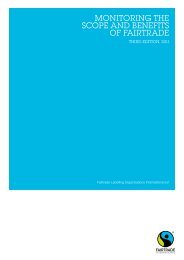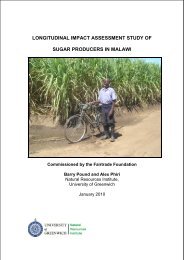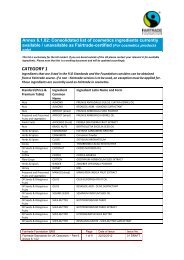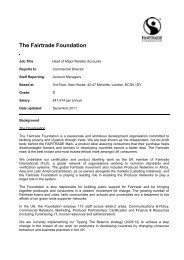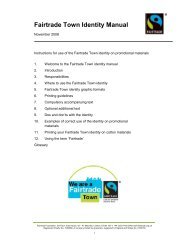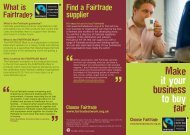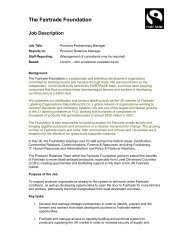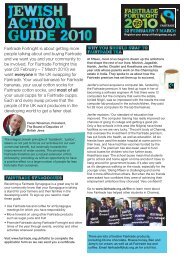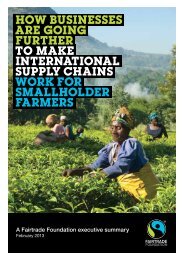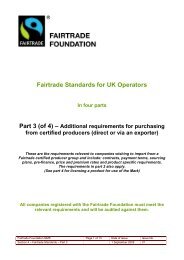the great cotton stitch-Up - The Fairtrade Foundation
the great cotton stitch-Up - The Fairtrade Foundation
the great cotton stitch-Up - The Fairtrade Foundation
Create successful ePaper yourself
Turn your PDF publications into a flip-book with our unique Google optimized e-Paper software.
Five years<br />
of <strong>Fairtrade</strong><br />
Cotton<br />
‘Our vision is of a world<br />
in which justice and<br />
sustainable development<br />
are at <strong>the</strong> heart of trade<br />
structures and practices.’<br />
What is <strong>Fairtrade</strong>?<br />
<strong>Fairtrade</strong> is a strategy for poverty alleviation and<br />
sustainable development. Its purpose is to create<br />
opportunities for producers and workers who have<br />
been economically disadvantaged or marginalised by<br />
<strong>the</strong> conventional trading system.<br />
Our vision is of a world in which justice and<br />
sustainable development are at <strong>the</strong> heart of trade<br />
structures and practices so that everyone, through<br />
<strong>the</strong>ir work, can maintain a decent and dignified<br />
livelihood and develop <strong>the</strong>ir full potential.<br />
<strong>The</strong> <strong>Fairtrade</strong> <strong>Foundation</strong>’s mission is to work with<br />
businesses, community groups and individuals to<br />
improve <strong>the</strong> trading position of producer organisations<br />
in <strong>the</strong> South and to deliver sustainable livelihoods for<br />
farmers, workers and <strong>the</strong>ir communities.<br />
Why did <strong>Fairtrade</strong> start working<br />
with <strong>cotton</strong> farmers?<br />
Cotton is vital to <strong>the</strong> global textile industry and to<br />
<strong>the</strong> social and economic development of developing<br />
countries. Cotton is a crucial cash crop for many<br />
developing countries and is often <strong>the</strong> only means of<br />
cash income for farmers.<br />
It is estimated that 100 million households are<br />
involved in <strong>cotton</strong> production in 70 countries around<br />
<strong>the</strong> world. Small-scale farmers often earn less than $2<br />
a day and struggle to provide a decent living for <strong>the</strong>ir<br />
families. Farmers are at <strong>the</strong> sharp end of a long and<br />
complex supply chain, often cheated by middlemen,<br />
as Khima Ranchhod in Gujarat, Western India told <strong>the</strong><br />
<strong>Fairtrade</strong> <strong>Foundation</strong>, ‘<strong>The</strong> buyer would always find a<br />
reason to offer us a poor price.’<br />
Recognising that most sustainability and ethical trading<br />
initiatives were focusing on garment manufacturing, <strong>the</strong><br />
<strong>Fairtrade</strong> system decided to focus its work firstly on <strong>the</strong><br />
<strong>cotton</strong> farmers <strong>the</strong>mselves, often <strong>the</strong> invisible part of<br />
<strong>the</strong> supply chain for Western consumers.<br />
What is <strong>Fairtrade</strong> Cotton?<br />
<strong>Fairtrade</strong> producer organisations receive:<br />
• A <strong>Fairtrade</strong> minimum price that always covers <strong>the</strong><br />
costs of sustainable production. This price varies<br />
by region and by <strong>cotton</strong> species<br />
• A <strong>Fairtrade</strong> minimum price for organic <strong>cotton</strong> set<br />
around 20% higher than <strong>the</strong> <strong>Fairtrade</strong> conventional<br />
minimum price<br />
• A <strong>Fairtrade</strong> premium of €5 cents/kg. <strong>The</strong> premium<br />
is used by producer organisations for social and<br />
economic investments such as education and health<br />
services, processing equipment and loans to members<br />
• Pre-export lines of credit on request of up to 60%<br />
of <strong>the</strong> purchase price.<br />
34 <strong>The</strong> <strong>great</strong> <strong>cotton</strong> <strong>stitch</strong>-up <strong>The</strong> <strong>great</strong> <strong>cotton</strong> <strong>stitch</strong>-up 35<br />
In addition:<br />
• <strong>Fairtrade</strong> environmental standards restrict<br />
<strong>the</strong> use of agrochemicals and encourage<br />
sustainability. <strong>Fairtrade</strong> growers are not obliged<br />
to be organic but standards require increased<br />
diligence in avoiding banned pesticides, encouraging<br />
reduction of chemicals and use of integrated crop<br />
management and biological alternatives where<br />
possible. <strong>The</strong>y are also required to make progress<br />
towards implementing a system of integrated crop<br />
management to promote environmental protection by<br />
progressively replacing traditional inputs with organic<br />
fertilizers, enabling <strong>the</strong>m to gradually convert to<br />
organic farming if <strong>the</strong>y wish to do so<br />
• <strong>Fairtrade</strong> <strong>cotton</strong> standards prohibit <strong>the</strong> use of<br />
genetically modified seeds in production but<br />
recognise that small-scale farmers may not<br />
always be able to protect <strong>the</strong>ir own land from<br />
cross contamination from neighbouring farms<br />
• Every operator in <strong>the</strong> supply chain that takes<br />
ownership of <strong>Fairtrade</strong> <strong>cotton</strong> and uses it in <strong>the</strong><br />
processing or manufacture of <strong>Fairtrade</strong> products<br />
until <strong>the</strong> point of licensing must submit independent<br />
verification documenting <strong>the</strong>ir efforts to comply with<br />
11 International Labour Organisation conventions,<br />
including those concerning forced labour, child<br />
labour, hours of work and freedom of association.<br />
Where <strong>the</strong> operator uses a sub-contractor for<br />
processing or manufacturing <strong>cotton</strong> products<br />
(including ginning, spinning, weaving, knitting, dyeing<br />
or o<strong>the</strong>r activities), <strong>the</strong> operator must demonstrate<br />
how <strong>the</strong> sub-contractor has made progress towards<br />
compliance with those conventions<br />
• <strong>Fairtrade</strong> is also working with some dedicated Fair<br />
Trade Organisations which, in addition to using<br />
<strong>Fairtrade</strong> certified <strong>cotton</strong>, are also applying Fair<br />
Trade principles to <strong>the</strong> garment manufacture stage.<br />
Many of <strong>the</strong>se organisations work with traditional,<br />
artisanal manufacturers who <strong>the</strong>mselves have<br />
a social mission to provide decent employment<br />
conditions and invest in additional worker benefits.



